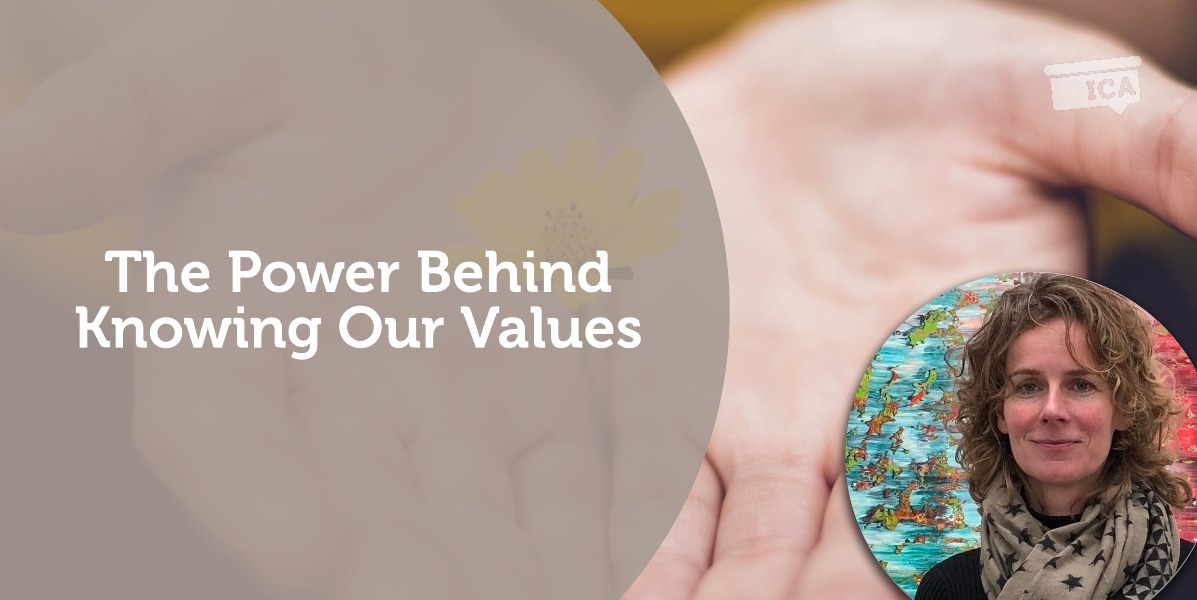
A Coaching Tool Created by Floor van Baal
(Life Coach, NETHERLANDS)
Your values, beliefs, and attitudes are the moral principles that guide you in your life and affect your behavior. We live our lives based on our core values. It is our foundation from where we make decisions.
Values reflect what is important, meaningful, and valued by a person, a group of people, or an organization. In this power tool, I will focus on the core values of individuals. Values in this tool, therefore, refer to Personal Values.
Why are values important to be aware of and what to do with this insight or knowledge? This power tool will describe what values are, how we find our own set of values and the power that lies behind this insight of knowing our values. I call this the power to live in alignment with our values.
Explanation Values, Beliefs, and Attitudes
What are the values
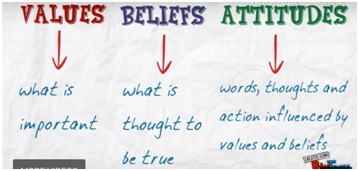 TJunction
TJunction
Definitions:
Principles or standards of behavior; one’s judgment of what is important in life. 1 (Oxford Dictionary)
This definition refers to beliefs that influence behavior.
Another definition is:
Personal Values are broad desirable goals that motivate people’s actions and serve as guiding principles in their lives. 2
According to this definition, values are more defined as a moral choice a person uses consistently in many situations. Values influence our behavior and attitudes. Values are a basic foundation of our attitudes and how we view everything that surrounds us. Decisions are often made based on values.
We now know that Personal values are desirable to a person and represent what is important to someone. This can include concepts like equality, honesty, education, effort, perseverance, loyalty, faithfulness, conservation of the environment, and many others.
Values are not based on information from the past and they are not contextual. Values are universal. Values transcend contexts because they are based on what is important to us. They arise from the experience of being human2.
A person has many different values. One value may be of more importance than another. It has been shown that the values that are most important to us often guide our decision making in all aspects of our life such as career, religion, social circles, self-identity etc.2.We do not have different values for the different areas of our life. Our working or career values are for instance also important for our personal growth or health.
Lists of personal values can be indefinite but research has shown value will generally fit into one of the ten types as Schwartz in 1992 presented 2.
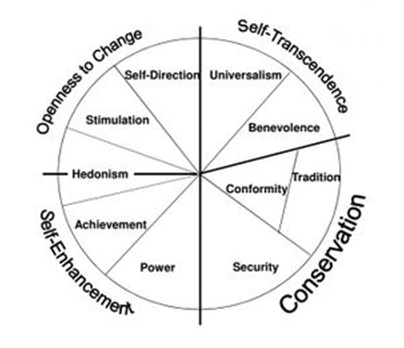
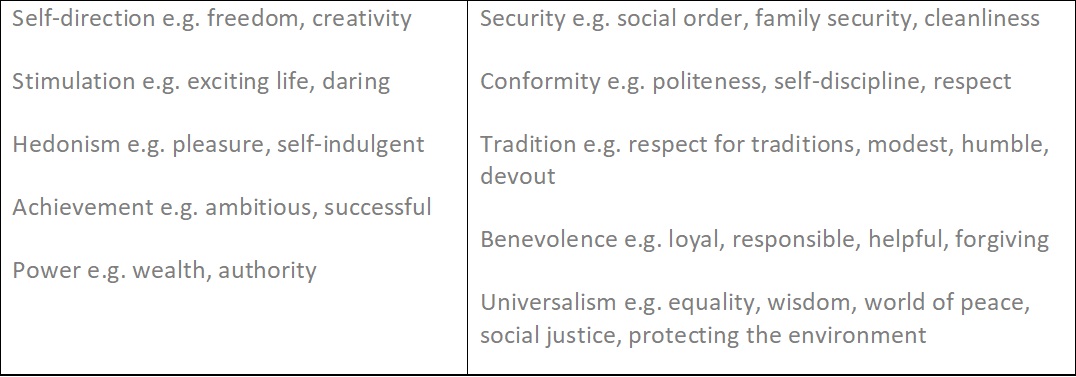 Schwartz Theory of Basic Values
Schwartz Theory of Basic Values
Each individual’s value system is different because an individual’s values are built up through life experience, environment, and family background. There is no set of ideal values and everyone will have their list of values with unique importance assigned to each one.3
What are beliefs
Beliefs refer to the conviction or acceptance that something exists or is true, especially without proof or evidence.
We use beliefs to help us understand the world around us. A person’s beliefs will guide them in their decision making and response to situations. Beliefs are usually formed in childhood or any other significant formative experience.4. Beliefs are therefore contextual. They arise from learned experiences, resulting from the cultural and environmental situations we have faced.
They are often, but not always connected to religion. Religious beliefs could include a belief that God created the earth in seven days. Religions other than Christianity also have their own set of beliefs. Non-religious beliefs could include that all people are created equal, which would guide us to treat everyone regardless of sex, race, religion, age, education, status, etc with equal respect. Conversely, someone might believe that all people are not created equal, which results in racist and sexist values and attitudes.
Beliefs are assumptions that we make about the world and our values stem from those beliefs. Our values are things that we find important. A belief will develop into a value when the person’s commitment to it grows and they see it as being important.
Attitudes are the feelings or opinions (mental dispositions) about something or someone before making decisions that result in behavior. People primarily form their attitudes from underlying values and beliefs.
It is important to realize that the same value in different people can show different behaviors. Someone who values success may work very hard to gain success in their career whereas someone else may take advantage of others to climb the career ladder.
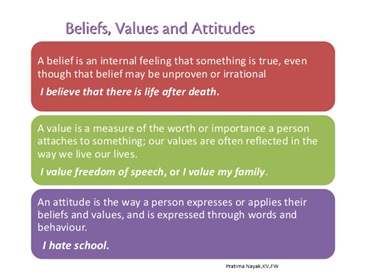 slideshare.net
slideshare.net
Values and beliefs are two important concepts that influence our behavior and attitudes. Although values and beliefs are interrelated since they affect our attitudes, perceptions, personality, character, and behavior, there is a distinctive difference between them. The main difference between values and beliefs is that values are principles, ideals, or standards of behavior while beliefs are convictions that we generally accept to be true.
Our values and beliefs are not fixed. It is possible for our values and beliefs that they change or the priorities of our values change over time as we have encountered evidence or have experiences that challenge our previously held views. They can also be strengthened by our experiences or evidence.
Summary:
- Beliefs are concepts that we hold to be true.
- Beliefs are connected to religion, but not always
- Values are ideas that we hold to be important.
- Values steer the way we behave, communicate and interact with others
- Beliefs and values determine our attitudes and opinions.
- Beliefs and values are not fixed.

The importance of values and value alignment
Our values reflect what is important to us. As we learned in the previous paragraph values together with beliefs are the causal factors that drive our decision-making. It is about why we do what we do.
It’s not hard to make a decision once you know what your values are. (Roy E. Disney).
In coaching, values are very important in the process of getting to know or understand yourself better. This will give you direction, motivation, and ultimately success or fulfillment. In other words, values help us to grow and develop. We are however often not aware of our values. If we do become aware of our values we can steer ourselves better in the direction we would like to go. We can also choose what is important to us and what we want to spend our time and energy on. Values can help us create the future we want to experience. Identifying and understanding our values also helps us to prioritize what is important to us. We will be better motivated to commit to and achieve goals based on or aligned with our values. Clarity of values is, therefore, an essential tool for goal setting and decision making.
Align your values with your actions and live a satisfied and happier life!
A personal value may be important to someone, but they are not implementing it in their daily life and they would like to implement it. Or it could also happen that a person may have a set of personal values that is not in line with their behavior. When our behaviors don’t match with our values, we will begin to sense an uneasiness and creates negative energy or undesirable behavior. To have clarity on your values is for that matter an essential tool.
If we live lives in alignment with our values, we are likely to be happier than if we don’t. When our actions and words are aligned with our values, we feel content, happy, confident, and satisfied. A person’s life will become less stressful and more productive.
We are more likely to achieve the goals that resonate with our beliefs and values!
Values can change over time, therefore it is important to check up on them regularly to ensure they are the right ones. For example, starting a family may cause you to value security and financial stability more than you did when you were single. Or a divorce may result in a desire for freedom or self-discovery.
When we use our values to make decisions, we make a deliberate choice to focus on what is important to us.(Valuescentre.com)
Coaching application
Open your arms to change, but don’t let go of your values. (Dalai Lama.)
Many clients come to a coach because they are not satisfied with their life and want to change something. They often lack a clear purpose in life and are not always aware of what their core values are. They do not realize that living in harmony with their values affects their happiness. The understanding of our values is the foundation of everything that we create in our lives. If you want to change make sure your actions are aligned with your values. If then nothing will change. Exploring and define a client’s values is therefore important in coaching.
To be successful it is not only important to know our core values but it also important that we live our values and not someone else’s. It is important that we check if the values we hold are our own and that they have not been imposed on us. When we make decisions that are not based on our values, the outcome feels empty, or we can feel uncertain. We may try to ignore and suppress this feeling but then won’t live our own lives and we will feel unsatisfied.
A coach can help a client to dig deep and find their values by asking powerful questions:
- What is most important to you in life?
- What makes things valuable for you?
- Where do you spend the best of your time and energy?
- What are your deep concerns?
- What most excites you in life?
- What guiding principles or standards do you live by that create the choices you make?
- Think about your actions. What decisions have you made to get you to where you are today?
- What personal values resonate most with you to live a great life?
In coaching, we can also use several exercises and tools that can help you find your values.
A list of values can help to find your core values. It is important to prioritize the values and choose the most important ones. According to Bene Brown, you only need two values5. I created my own values test where you choose and prioritize five values from a list of many different values. It is short and quick and will take you less than ten minutes.
You can also use different online assessment to find out what your values are. For example, Barrett Values Assessment6 is commonly used. You can do this test online and receive a personal report. And there are many more (free) online tests you can find.
Discussing the role models of your client can also be an effective tool. Ask the client about their role model and specifically what they value about this role model.
After the value exercise let your client looks at her values and ask:
- Do your values resonate with what you thought you wanted to achieve?
- Do you live your life in alignment with your values?
- How are your values reflected in your daily life?
- Are you spending your time on things that matter to you?
- What is the connection between your values and your goals?
- What impact has this value on your life or goal?
- Are you living your values or are these values of someone else?
- What would you like to change around your values?
- Or would you change your actions or decisions to better match your values?
References and Resources
Oxford Dictionary
Sagiv L, Roccas S, Cieciuch J, Schwartz SH. Personal values in human life. Nature Human Behaviour. 2017 Sep;1(9):630
Beck JS. Cognitive behavior therapy: Basics and beyond. Guilford Press; 2011
Wenzel A.Modification of core beliefs in cognitive therapy. Instandardandinnovativestrategies in cognitive-behavior therapy in 2012.